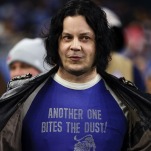Readers may never know why Waxman reports with a maximum of vitriol and a complete dearth of empathy, but it seems like her idea of balance, to paraphrase Russell Crowe in A Beautiful Mind, is having a chip on each shoulder. Consequently, filmmakers as diverse as David O. Russell, Quentin Tarantino, David Fincher, and Paul Thomas Anderson get their ambiguities, shadings, and complexities sheared off until they all essentially seem like variations on the same egomaniacal, bullying, backstabbing, arrogant bastard, a power-crazed dictator with a megaphone, perpetually high on hype and a bloated sense of self-regard (along with plenty of other illicit substances). On the rare occasions Waxman isn't able to caricature a filmmaker as an emotionally stunted ball of hubris and malice, she still manages to find weaknesses to pick at mercilessly. Steven Soderbergh, for example, is harped on for being unable to commit to romantic relationships, while Spike Jonze is portrayed as a half-literate idiot savant who makes some of the most dazzlingly original comedies of all time, but has difficulty reading the average Ziggy comic.
Buried amid all the character assassination and low blows—is anything gained by lingering on Tarantino's reportedly appalling personal hygiene?—are some compulsively readable accounts of the making of wildly audacious films like Boogie Nights, Being John Malkovich, Traffic, Fight Club, and Three Kings, movies that pitted the perseverance and ingenuity of filmmakers against the cluelessness and cowardice of studios. Waxman's vicious gossip-as-history approach—which echoes Peter Biskind's compulsively readable, utterly trashy Hollywood epics Easy Riders, Raging Bulls and Down And Dirty Pictures—can be invigorating and exciting in small doses, but becomes suffocating and toxic over the course of an entire book. Waxman's got a wonderful, meaty story to tell, but it's strangled by the ugliness and mean-spiritedness of its telling.







![Rob Reiner's son booked for murder amid homicide investigation [Updated]](https://img.pastemagazine.com/wp-content/avuploads/2025/12/15131025/MixCollage-15-Dec-2025-01-10-PM-9121.jpg)

























![HBO teases new Euphoria, Larry David, and much more in 2026 sizzle reel [Updated]](https://img.pastemagazine.com/wp-content/avuploads/2025/12/12100344/MixCollage-12-Dec-2025-09-56-AM-9137.jpg)







